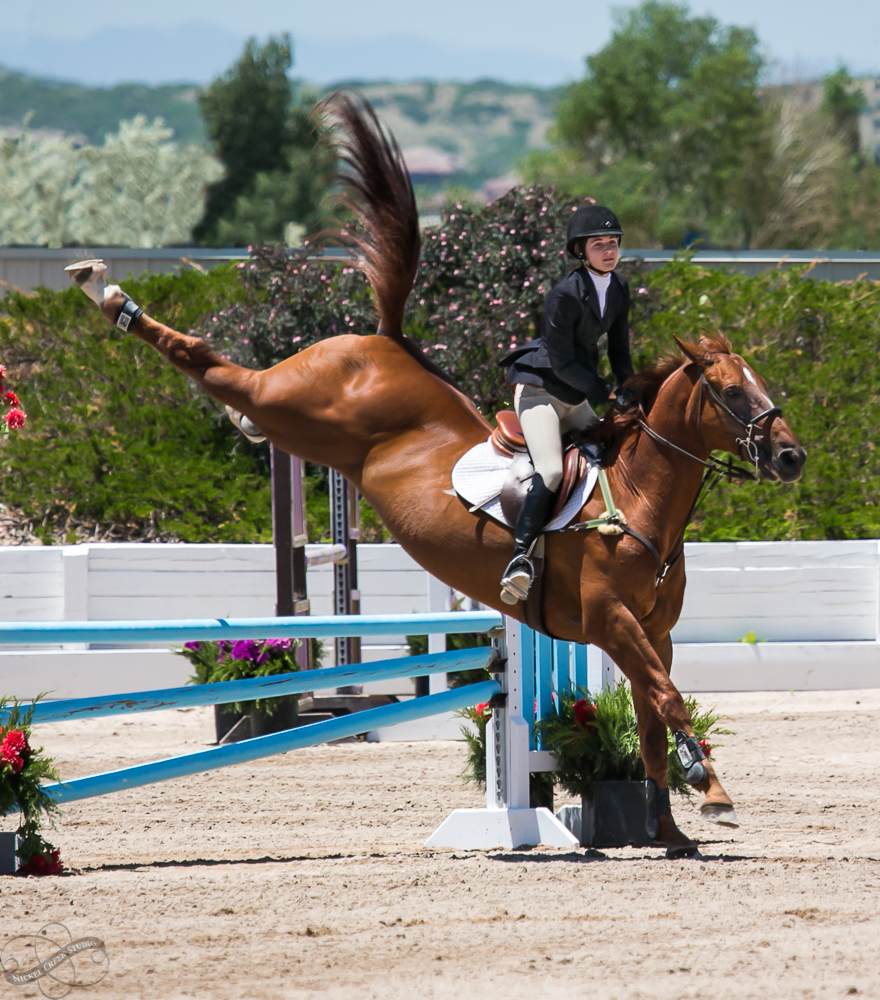Kentucky Performance Products outlines a few dietary reasons your horse might seem “a little crazy,” and makes some feeding suggestions for tempering that excitability.
From the Kentucky Performance Products Tips & Topics blog:
Can what you feed be making your horse a little crazy? The short answer is yes, it might be.
Diets high in simple carbohydrates, like the sugars and starches found in some concentrates (those high in grain and molasses), can cause a horse to have hormone fluctuations that lead to anxiousness and excitability. While providing some simple carbs in the diet is important, when large amounts at a time are fed, the sugar rush eventually results in a crash and this fluctuation can make your horse a little nuts.
When too many sugars/starches are fed in a single feeding, your horse’s digestive system can be overwhelmed. Simple carbs that can’t be digested and absorbed in the stomach and small intestine escape into the hindgut and cause imbalances that can lead to indigestion and even colic or laminitis.
Not every horse reacts in the same manner to a high-sugar diet, but if you have a horse that seems to be excitable and “high,” a diet change might help to calm him or her down. In some cases horses that have indigestion caused by a diet high in simple carbs will be anxious and irritable because they don’t feel well. A diet change can help remedy that problem as well.
Using fat and super fibers as an alternative energy source is the right direction to move toward. Fats are often described as “cool” feeds because they reduce excitability. Fats, such stabilized rice bran are digested at a much slower rate and don’t cause the hormone spikes associated with excitability. Fats contain more energy pound for pound than simple carbs so you can feed smaller meals and deliver just as many calories, if not more. As an added benefit, fats will not cause the hindgut overload that large sugar/starch meals can cause, reducing anxiousness, irritability and the risk of colic or laminitis.
As with all equine diets, fiber (hay, pasture, hay cubes or pellets) should be a major component. Fiber is digested in the hindgut and provides a consistent energy source. Fiber is critical to a balanced digestive tract and therefore the health and wellbeing of the horse. Super fibers such as molasses-free beet pulp provide an excellent source of extra energy for horses that tend to be “high.”
When trying to control sugar levels in the diet, manage pasture so that turnout occurs during times when sugar levels are at their lowest and feed hays with low nonstructural carbohydrates (NSC) values.
While simple diet changes will not alter your horse’s base personality, it might help temper it and reduce excess anxiety and excitability.
Article written by KPP staff.
Copyright (C) 2016 Kentucky Performance Products, LLC. All rights reserved.
Article sponsored by Equi-Jewel, high-fat, heat-stabilized rice bran. Equi-Jewel is an excellent source of safe calories that support proper muscle function.
When health issues arise, always seek the advice of a licensed veterinarian who can help you choose the correct course of action for your horse. Supplements are intended to maintain healthy systems and support recovery and healing. They are not intended to treat or cure illness or injury.
About Kentucky Performance Products, LLC: Since 1998, Kentucky Performance Products has simplified a horse owner’s search for research-proven nutritional horse supplements that meet the challenges facing modern horses. KPP horse supplements target specific nutritional needs and are formulated to complement today’s feeds, thus safeguarding against over-supplementation. Each product is scientifically formulated and made with high-quality ingredients at certified manufacturing facilities. Kentucky Performance Products is proud to offer a quality assurance promise backed by a money-back guarantee. Kentucky Performance Products brings you horse supplements you can count on because the horse that matters to you, matters to us.


